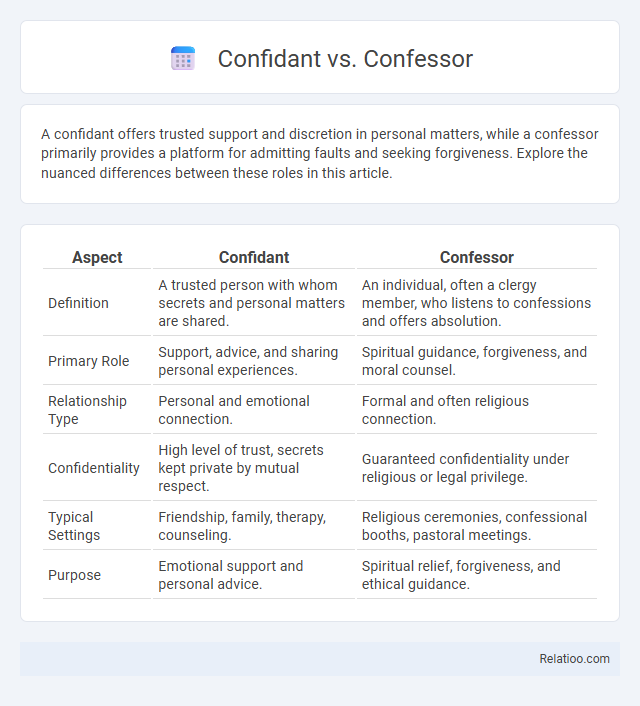A confidant offers trusted support and discretion in personal matters, while a confessor primarily provides a platform for admitting faults and seeking forgiveness. Explore the nuanced differences between these roles in this article.
Table of Comparison
| Aspect | Confidant | Confessor |
|---|---|---|
| Definition | A trusted person with whom secrets and personal matters are shared. | An individual, often a clergy member, who listens to confessions and offers absolution. |
| Primary Role | Support, advice, and sharing personal experiences. | Spiritual guidance, forgiveness, and moral counsel. |
| Relationship Type | Personal and emotional connection. | Formal and often religious connection. |
| Confidentiality | High level of trust, secrets kept private by mutual respect. | Guaranteed confidentiality under religious or legal privilege. |
| Typical Settings | Friendship, family, therapy, counseling. | Religious ceremonies, confessional booths, pastoral meetings. |
| Purpose | Emotional support and personal advice. | Spiritual relief, forgiveness, and ethical guidance. |
Defining Confidant and Confessor
A confidant is a trusted person with whom you share private thoughts and secrets, providing emotional support and discretion. A confessor, often associated with religious contexts, is someone to whom you confess sins or wrongdoings, seeking forgiveness and guidance. Understanding the distinction helps clarify when to turn to a confidant for personal advice versus a confessor for spiritual or moral counsel.
Historical Origins of Both Roles
The historical origins of the roles of confidant and confessor trace back to distinct social and religious contexts, with confidants emerging from the aristocratic courts of medieval Europe as trusted advisors privy to intimate secrets, while confessors originated within the early Christian Church as clergy assigned to hear confessions and offer spiritual guidance. The confidant's role evolved primarily in secular settings, often linked to political and personal counsel, whereas confessors held a formal ecclesiastical position responsible for administering the sacrament of confession. Both roles share the common element of trust and discretion but serve fundamentally different purposes shaped by the cultural and institutional frameworks of their times.
Key Differences Between Confidant and Confessor
The key difference between a confidant and a confessor lies in their roles: a confidant is someone you trust to share personal information and secrets, offering emotional support and discretion, while a confessor refers specifically to a person, often a priest, to whom you confess sins for spiritual guidance and absolution. Your choice between a confidant and a confessor depends on whether you seek empathetic companionship or religious counsel. Understanding these distinctions helps you communicate effectively and find the appropriate support for your needs.
Psychological Impact of Each Relationship
Confidants provide a safe space for you to share personal thoughts and emotions, fostering trust and emotional support that aids in stress reduction and mental resilience. Confessors, often in religious or therapeutic roles, offer judgment-free listening and guidance which can lead to feelings of relief and spiritual or psychological cleansing. The psychological impact of these relationships varies, with confidants nurturing ongoing emotional intimacy while confessors facilitate episodic catharsis and moral reconciliation.
Role in Building Trust and Secrecy
A confidant serves as a trusted individual with whom one shares personal thoughts and secrets, facilitating emotional support and fostering trust through discretion. A confessor, often in a religious context, is someone to whom confessions are made, emphasizing the role of absolution and confidentiality in maintaining secrecy. Both roles are crucial in creating safe spaces where trust is built by ensuring that sensitive information remains protected and respected.
Confidant vs Confessor in Literature
In literature, a confidant serves as a trusted character to whom the protagonist reveals secrets, aiding in plot development and character depth. A confessor, often linked to religious or moral authority, receives admissions of guilt or sin, emphasizing themes of redemption or internal conflict. You can explore how authors use confidants to advance personal narratives, while confessors highlight ethical dilemmas and spiritual introspection.
Ethical Considerations and Boundaries
Confidants and confessors differ significantly in ethical considerations and boundaries, with confidants offering emotional support without formal duties, while confessors hold obligations of confidentiality within religious or professional contexts. Your relationship with a confidant is built on mutual trust and voluntary sharing, but confessors are bound by strict confidentiality codes and ethical guidelines to protect sensitive information. Understanding these distinctions helps maintain appropriate boundaries, ensuring ethical support and respect for privacy in each role.
Social Contexts: When to Choose Whom
In social contexts, choosing between a confidant, confessor, or confidant depends on the nature of your relationship and the information you wish to share. A confidant is someone you trust with personal secrets and emotional support, while a confessor typically refers to a person, often a clergy member, to whom you admit sins or moral concerns. Understanding the specific roles helps you decide the most appropriate person for your needs, ensuring your trust is placed wisely within your social circle.
Modern-Day Applications and Examples
A confidant is someone you trust with personal information, often serving as a friend or advisor in modern relationships, while a confessor refers specifically to a person who hears confessions, typically in religious contexts such as a priest in the Catholic Church. In professional or therapeutic settings, your confidant might be a counselor or mentor who helps you navigate challenges, whereas a confessor's role is more formal and tied to spiritual guidance and absolution. Understanding these distinctions enhances your ability to choose the right support system, whether for emotional support or moral reflection.
Helping Others: Confidant and Confessor in Self-Discovery
A confidant provides a trusted space where you can share personal thoughts and emotions without judgment, fostering deeper self-awareness and growth. A confessor often involves a more formal or spiritual context, where revealing mistakes or secrets can lead to forgiveness and inner peace. Both roles support your journey of self-discovery by encouraging honesty and reflection, yet the confidant emphasizes emotional support while the confessor emphasizes moral or spiritual cleansing.

Infographic: Confidant vs Confessor
 relatioo.com
relatioo.com